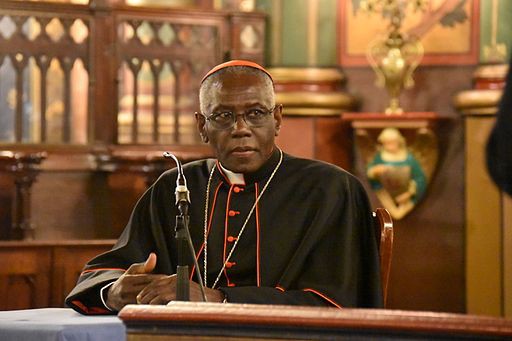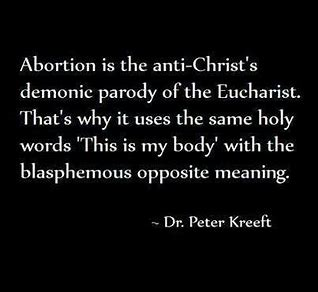
Pope Francis will die in our lifetime. He is already 82. I favor the next pope to have African or Oriental ancestry. Those are my opinions thus subject to error. Race has nothing to do with being a candidate.
…+
It may turn out that the most powerful voice for the Catholic Church today is an African Cardinal named Robert Sarah. A Native of Guinea and a survivor of the dictatorship of Sekou Toure, he is now the head of Congregation of Divine Worship and the Discipline of the Sacraments.
Reading his latest book, The Day Is Now Far Spent, (Ignatius 2019), I was surprised by his powerful teaching. The reactionary movements in the United States Catholic Church praise him because he embraces traditional morality and demands good Catholic liturgy. It does not take long to see there is much they praise in some flag waving political movements that he finds quite troubling.
As an African, he looks at the United States and Europe not only as an outsider, but like he was on the Carpathia and able to see the Titanic sink below the cold Atlantic. Comparing the current Western Civilization to the final days of Rome, he sees little hope for its future. He resounds the same warning that Alexander Solzhenitsyn spoke at Harvard in 1976.
Unlike the vast majority of bishops in the United States. He sees that Western Catholicism not only lost its bearing but its courage and backbone when it exchanged the truth for a lie — spirituality for materialism. The result is without the prophetic life of the Church to counter them, nations in the west are succumbing to a fierce tyranny as serious as Nazism and Communism, he laments.
One who truly loves the gifts of all cultures, he has concerns about the United Nations and the European Union who try to build one culture and one world out of the many. They root themselves in European unity which he also decries. He calls it “the project that consists of trying to annihilate the history of the States on the altar of financial interests,” which he labels a dangerous utopia.
“The U.N. elites dream of a world government that will rule peoples, cultures and traditions that were formerly so different. It is a dream that borders on madness and is a sign of the contempt of the peoples for their riches.” He writes.
The African Cardinal not only denounces materialism and its pursuit of wealth, he considers capitalism not a solution to communism but the opposite side of the same coin.
This leads western societies to reject the true God so that we can create our own divinities in the name of corporate financial success.
The postmodern world is the kingdom of idols, sorcerers, and astrologers. These gods and their clergy are cruel. They do not care about life and joy. Behind the black curtains of a false humanism, they are at the service of financial capitalism.
Many outside the Church, who reject our morality, will disagree with his moral teaching, but they will be fascinated with his diagnosis. Cardinal Sarah, while embracing Catholic doctrine would tell the Christians pointing the condemning fingers at those who live lifestyles we reject to note the three fingers pointing back.
The current rise of changes from traditional morality are symptoms that the Catholic community severed itself from spirituality. He particularly laments and cites as cause the lack of a discipline fostering silence — a world without distractions — in Catholic lives today, especially among priests and bishops. This, he says, coupled with the proliferation of electronic devices, is what is destroying spirituality and society. The symptoms of it are the moral breakdown.
Cardinal Sarah, echoing Pope St. John Paul II, cites the disastrous decisions of the Western intervention into Iraq as well as Yemen, Syria and Libya and believes that this was done in support of Western financial interests at the expense of the peace in these societies. The wildest radical screaming “No Blood for Oil” does not seem to be as strong as Cardinal Sarah in condemning that military intrusion.
He warns that the Church’s call is to foster reason and purify it. This is a radical split from those who talk Christianity as a Bible based church that sees the United States as the New Israel and that bonks people over the head with Leviticus. No, the Church is here to purify reason. This is to build a just society where peace flourishes. He warns our failures in this role produce law that has no transcendent foundation which “turns into a totalitarian power.” Therefore, he explains, that the role of the Church is to “set up a barrier against totalitarian arbitrariness that emancipates itself from natural law.”
In other words, the true role of the Christian is to foster wisdom, love and justice for all in the society.
The solution, he teaches, is to return to traditional spirituality in all its splendor. He calls priests and bishops to foster silence in their lives and build parishes around Eucharistic adoration. This is silent prayer around the tabernacle containing the Eucharist — the Body and Blood of Christ.
Drawing heavily on the teachings of Alexander Solzhenitsyn, he calls clergy to reject materialism and prayerfully embrace the virtues. The cause of the sex abuse crisis was not homosexuality or the demands of celibacy, the Cardinal explains, but embracing consumerism and materialism when we must live the prophetic virtues of poverty, chastity and charity among others. Materialism and consumerism anesthetize the contemplative life, he teaches, and make one falsely believe he is powerful. Rejecting them leads one to see his existence in the truth by seeking the one who is the truth.
The consumer society is inebriating; it sets man against God. Like a man who staggers because he has drunk too much, Western man defies God and refuses to adore him. He believes that he himself is all powerful, whereas he has never been so frail.
He predicts that many in the Church in the west will suffer actual martyrdom and notes they are experiencing a daily martyrdom — suffering the contempt of the world. Especially, he notes, Christian parents. “You must confront the contempt of the world when you choose to give life.”
The Cardinal insists on living the virtue of fortitude which he defines in St. Augustine’s terms of “love readily bearing all things for the sake of the loved object,” and it “is the virtue that helps us to confront bodily and spiritual dangers.” He goes further to remind people that “Jesus said that we are the salt of the Earth, not the sugar of the Earth.”
I do not see Cardinal Sarah calling for an angry activism that many equate with a politicized Christianity we see today. What I do see is the call to live disciplined spirituality that allows one to see the world from the outside and love those on the inside.
In the west, where bishops of the Church, Cardinal Sarah’s words are a powerful reminder of why Jesus founded His Church. We discover in the pages of The Day Is Now Far Spent, what Christ is saying to us through the current chastisement and where we must go from here.
The Prophetic African Voice in Catholicism
Pope Pius XIII?
Last edited:


